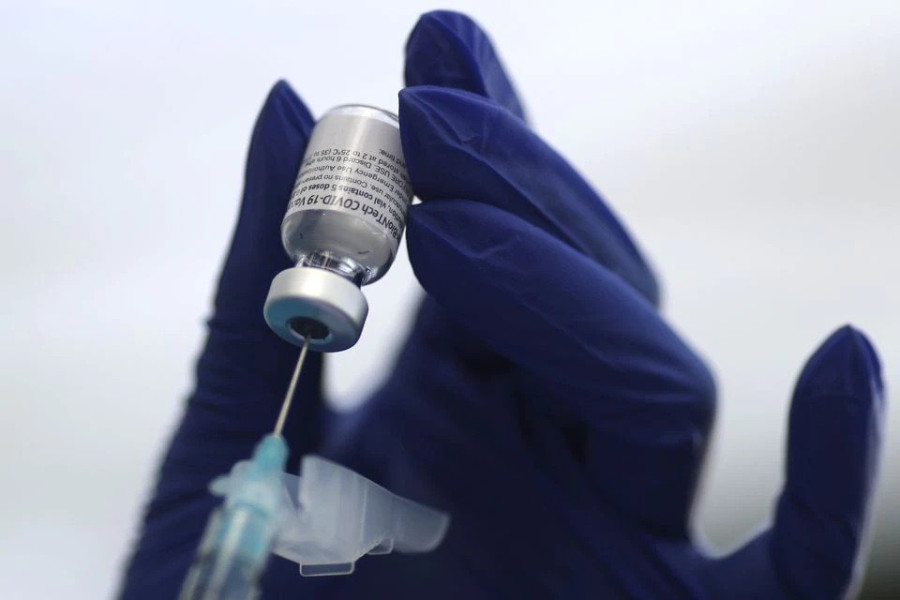Health
Syringe shortage delays Pfizer vaccination
Government plan to inoculate children aged 12-17 with Pfizer jabs from today has been postponed until further notice.
Arjun Poudel
It was expected. Nepal was receiving vaccines in their millions, but it was not paying much attention to the need for the humble equipment needed to inject the medicine. A shortage of syringes was in the making. And it happened.
The government on Monday decided to put on hold its plan to vaccinate children aged 12-17 with the Pfizer-BioNTech vaccine, saying there are no syringes in stock.
“Our plans to roll out the Pfizer-BioNTech vaccine have been affected due to a lack of syringes,” Sagar Dahal, chief of the National Immunisation Programme, told the Post. “The regular campaign to vaccinate people with Vero Cell, AstraZeneca, Moderna and Janssen vaccines, however, will continue.”
A 0.5ml auto-disable syringe is used for other vaccines while a 0.3ml syringe is needed for Pfizer-BioNTech.
Health authorities were planning to vaccinate children aged 12-17 in eight districts including the three districts of the Kathmandu Valley from Tuesday.
Nepal received 664,560 doses of Pfizer-BioNTech vaccine, donated by the United States through the COVAX facility, the international vaccine sharing scheme backed by the United Nations, on Friday.
But syringes were not delivered along with the vaccines, officials said.
“COVAX will supply syringes in the next couple of days and we will start the vaccination,” Dr Surendra Chaurasia, chief of the Logistic Management Section under the Department of Health Services, told the Post. “Not only syringes, we have also run out of diluent, a substance required to mix the vaccine, which is yet to be delivered by COVAX.”
The Post reported last week that Nepal could face a syringe crisis given the rising global demand for the device.
Officials, however, claimed that syringe supply was not a problem at present, as the government had already placed orders. But if consignments fail to arrive on time, the vaccination campaign may get affected, they said.
Despite facing initial hiccups, Nepal managed to pick up pace in vaccinating its population as doses started to arrive from various sources, including COVAX. Nepal has even bought doses directly from companies.
So overwhelmed the storage facilities became that authorities even requested providers to slow down shipments, fearing a lack of space to store the shots and expiry of some doses.
Nepal so far has received 39,203,927 doses of various Covid-19 vaccines—Vero Cell, AstraZeneca, Moderna, Janssen and Pfizer-BioNtech.
Countries like Bhutan, Japan, the Maldives, the United States, the United Kingdom, India, China, Denmark, Canada and Switzerland have donated the vaccines either through COVAX facility or directly.
Nepal launched its vaccination drive on January 27 with the 1 million doses of Covishield, the AstraZeneca type vaccine manufactured by the Serum Institute of India, provided by India in grant.
As of now, 10,166,504 people, or 33.5 percent of the total population, have been fully vaccinated in Nepal.
Estimates suggest there are around 13 million doses currently in stock across the country. But syringes, according to officials, are insufficient.
Officials say the COVAX facility supplies syringes along with the vaccines, but for the vaccines procured or received as donations, the government needs to purchase the devices.
Experts say management issues have always been a cause for concern from the day Nepal launched its vaccination drive.
“Authorities should have paid attention to the fact that there should be enough syringes to continue the vaccination campaign,” said Bhogendra Dotel, former chief of the Logistic Management Section at the Department of Health Services. “As more doses were arriving, officials should have purchased syringes in advance.”
That the syringes could be in short supply was warned by the United Nations Children’s Fund also.
The UN children’s agency said last month that urgent action was needed to ensure sufficient Covid-19 vaccine syringe supply to meet 2022 vaccination targets.
Increased demands, supply chain disruptions, and “syringe nationalism” could lead to significant challenges in 2022 without immediate action, it said.
Rich countries, which have hoarded more doses than their requirement, have also stockpiled the desperately needed safe injection equipment.
“Without action now, the world could face a serious shortage of Covid vaccine syringes by the end of 2022, with potentially dire consequences for the global effort to bring the pandemic under control,” UNICEF warned.
Syringe shortages had become an issue in neighboring India also after authorities there did not order sufficient syringes in advance.
Several countries around the globe have also experienced syringe shortages as they are in different stages of their vaccination drives.
Nepali officials said hopefully the Pfizer syringe crisis will be over soon and that there won't be shortages of syringes to continue its regular vaccination drive.
After Nepal revised its earlier plan to inoculate its 72 percent of over 30 million population to include children aged 12-17 years, the country now needs to vaccinate 78 percent of the total population.
The government from December 19 started vaccinating over 1.74 million children aged between 12 and 17 years in 57 districts with the Moderna Covid-19 vaccine.
The vaccination drive will continue until Tuesday.
The plan to inoculate more children of the age group with Pfizer shots from Tuesday, however, is now in limbo.
Nepal needs to manage more 0.3ml syringes at the earliest as more Pfizer shots are arriving soon.
Nepal has signed a deal to buy 6 million doses of the Pfizer-BioNTech vaccine.
According to officials, the said doses from the US pharma company are expected to arrive within January.
Earlier, the government provided the Pfizer-BioNTech vaccine to the people above 12 years of age with compromised immunity from November 14. Later, it was opened to all children aged 12-17.
“A halt in the vaccination programme due to syringe shortages shows our ineffective planning and management,” said an official at the Department of Health Services, asking anonymity as he feared retribution. “Our handling of the pandemic has not been up to the mark since Day 1. Now not having syringes when we have enough vaccines is just pathetic.”
This article has been updated.




 14.86°C Kathmandu
14.86°C Kathmandu















